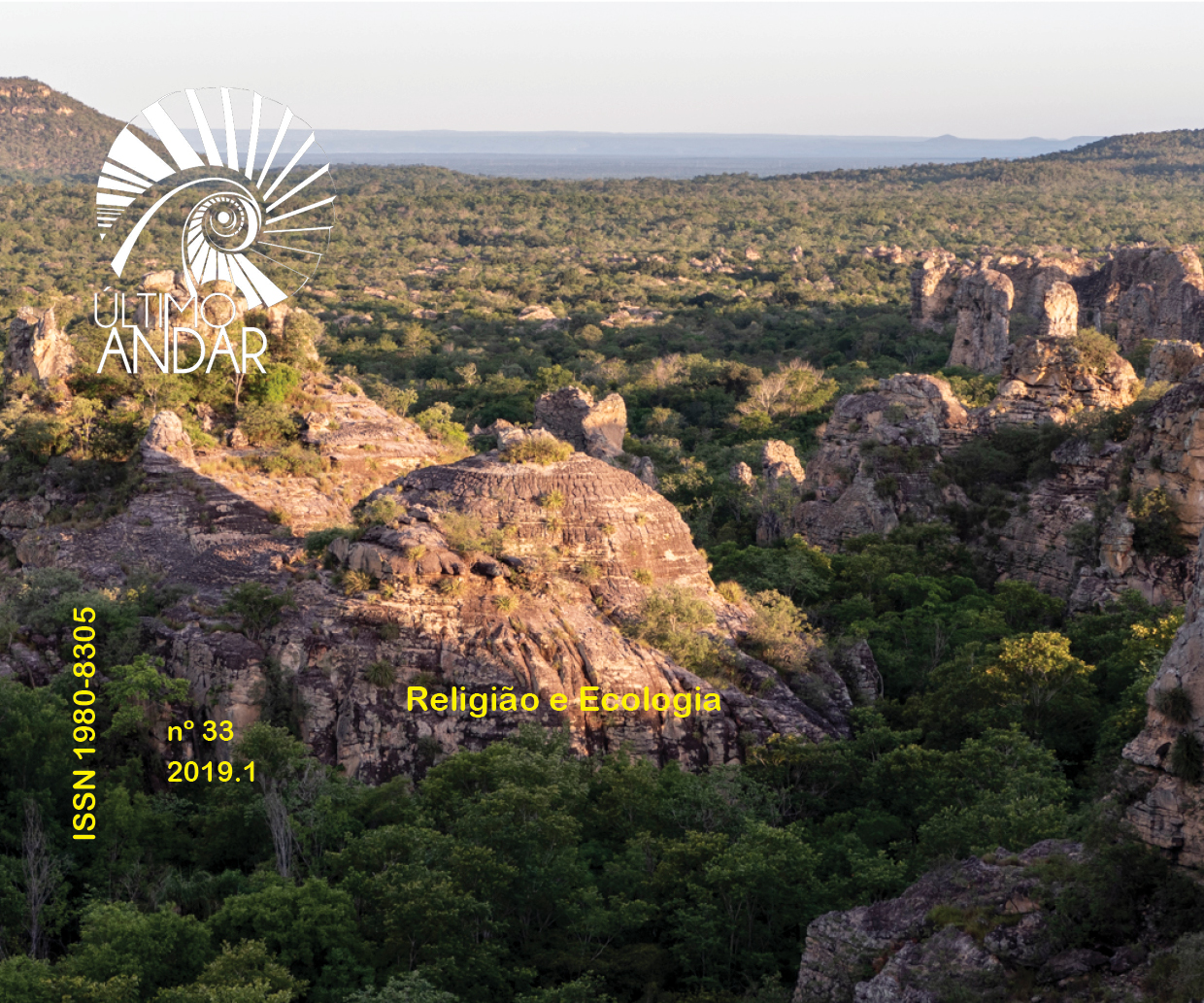Retrato: ANN TAVES - De experiências estranhas a eventos reveladores
DOI:
https://doi.org/10.23925/1980-8305.2019.i1p166-185Keywords:
religião, experiências religiosas, fenomenologia da religião.Abstract
O presente texto apresenta ao público brasileiro uma breve autobiografia de uma das mais proeminentes cientistas da religião da atualidade, Ann Taves (universidade da Califórnia, campus Santa Bárbara). Ela destaca os interesses principais desenvolvidos ao longo da carreira, sendo que para nós o mais importante é o tema da "experiência religiosa", para o qual a autora apresenta uma abordagem mais distanciada, muito citada desde então.References
ASPREM, Egil. 2016. “Reverse-Engineering ‘Esotericism’: How to Prepare a Complex Cultural Concept for the Cognitive Science of Religion.” Religion 46/2, 158-175.
BARRETT, Nathaniel F. 2014. “The Perception of Religious Meaning and Value: An Ecological Approach.” Religion, Brain, and Behavior 4, no. 2: 127-146.
BLOCH, Maurice. 2008. “Why religion is nothing special but is central.” Philosophical Transactions of the Royal Society B 363: 2055-2061.
BLOCH, Maurice. 2010. “Bloch on Bloch on ‘Religion.’” Religion and Society: Advances in Research 1: 4–28.
BOYER, Pascal, and B. Bergstrom. 2008. “Evolutionary perspectives on religion.” Annual Review of Anthropology 37:111–130.
BRETT, C.M.C. et. al. 2007. “Appraisals of Anomalous Experiences Interview (AANEX): A Multidimensional Measure of Psychological Responses to Anomalies Associated with Psychosis.” The British Journal of Psychiatry 191, no. 51: s23-s30.
BRETT, C.M.C. et. al. 2009. “The Role of Metacognitive Beliefs in Determining the Impact of Anomalous Experiences: A Comparison of Help- seeking and Non-help-seeking Groups of People Experiencing Psychotic-like Anomalies.” Psychological Medicine 39, no. 6: 939-950.
DISSANAYAKE, Ellen. 1990. What is Art for? Seattle: University of Washington Press.
GOFFMAN, Erving. 1974. Frame Analysis: An Essay on the Organization of Experience. New York: Harper & Row.
INSEL, Thomas. 2013. “Director’s blog: Transforming diagnosis.” http://www.nimh.nih.gov/about/director/2013/transforming-diagnosis.shtml (accessed 13 March 2015).
JOHNSTON, Hank and NOAKES, John A. eds. 2005. Frames of Protest: Social Movements and the Framing Perspective. Lanham, MD: Rowman & Littlefield Publishers, Inc.
KAPFERER, Bruce. 2013. “Ritual Practice and Anthropological Theory.” Religion and Society: Advances in Research 4: 3–40.
LEWIS, James R. 2003. Legitimating New Religions. New Brunswick, NJ: Rutgers University Press.
MALLE, Bertram. 2004. How the Mind Explains Behavior: Folk Explanations, Meaning, and Social Interaction. Cambridge, MA: The MIT Press.
RADVANSKY, Gabriel A., and Jeffrey M. Zacks. 2011. “Event perception.” WIREs Cognitive Science, 2: 608-620.
RADAVANSKY, Gabriel A., and Jeffrey M. Zacks. 2014. Event Cognition. Oxford: Oxford University Press.
SPERBER, Dan. 1996. Explaining Culture: A Naturalistic Approach. Oxford: Blackwell.
SPILKA, Bernard, Philip Shaver, and Lee A. Kirkpatrick. 1985. “A General Attribution Theory for the Psychology of Religion.” Journal for the Scientific Study of Religion 24, no. 1: 1-20.
TAVES, Ann. 1999. Fits, Trances, and Visions: Experiencing Religion and Explaining Experience from Wesley to James. Princeton: Princeton University Press.
TAVES, Ann. 2005. “Religious Experience.” Pp. 7736-7750 in The Encyclopedia of Religion, 2nd edition, ed. L. Jones. New York: Macmillan.
TAVES, Ann. 2006. “Where (Fragmented) Selves Meet Cultures: Theorising Spirit Possession.” Culture and Religion 7, no. 2: 123-138.
TAVES, Ann. 2009. Religious Experience Reconsidered: A Building Block Approach to the Study of Religion and Other Special Things. Princeton: Princeton University Press.
TAVES, Ann. 2010a. “No Field Is an Island: Fostering Collaboration between the Academic Study of Religion and the Sciences.” Method and Theory in the Study of Religion 22: 170-188.
TAVES, Ann. 2010b. “Experience as a Site of Contested Meaning and Value: The Attributional Dog and Its Special Tail.” Religion 40: 317-323.
TAVES, Ann. 2013a. “Building Blocks of Sacralities: A New Basis for Comparison across Cultures and Religions.” Pp. 138-161 in Handbook of the Psychology of Religion and Spirituality, ed. R. F. Paloutzian and C. L. Park. New York: Guilford.
TAVES, Ann. 2013b. “Non-Ordinary Powers: Charisma, Special Affordances and the Study of Religion.” Pp. 80-97 in Mental Culture: Classical Theory and the Cognitive Science of Religion, ed. D. Xygalatas and W.W. McCorkle, Jr. Bristol, CT: Acumen.
TAVES, Ann. 2014. “Parsing Meaning and Value in Relation to Experience.” Religion, Brain, and Behavior 4, no. 2: 161-166, DOI: 10.1080/2153599X.2013.816344
TAVES, Ann. 2015. “Reverse Engineering Complex Cultural Concepts: Identifying Building Blocks of ‘Religion.’” Journal of Cognition and Culture 15: 197-221.
TAVES, Ann. 2016. Revelatory Events: Unusual Experiences and the Emergence of New Spiritual Paths. Princeton: Princeton University Press.
TAVES, Ann, and Egil Asprem. 2017. “Experience as Event: Event Cognition and the Study of (Religious) Experiences.” Religion, Brain and Behavior 7/1, 43-62.
TAVES, Ann, and Stephen C. Harper. 2016. “Joseph Smith’s First Vision: New Methods for the Analysis of Experience-Related Texts.” Mormon Studies Review 3, 53-84.
WHITEHOUSE, Harvey, and Jonathan A. Lanman. 2014. “The Ties That Bind Us: Ritual, Fusion, and Identification.” Current Anthropology 55, no. 6: 674-695.
Downloads
Published
How to Cite
Issue
Section
License
The Authors maintain the copyright and grant the journal the right to first publication, with the work simultaneously licensed under the Creative Commons Attribution License that allows the sharing of the work with acknowledgment of authorship and initial publication in this Journal.
Authors are authorized to assume additional contracts separately, for non-exclusive distribution of the version of the work published in this journal (eg, publishing in institutional repository or as a book chapter), with acknowledgment of authorship and initial publication in this journal.
Authors are allowed and encouraged to publish and distribute their work online (eg in institutional repositories or on their personal page) at any point before or during the editorial process, as this can generate productive changes, as well as increase impact and citation of the published work.


